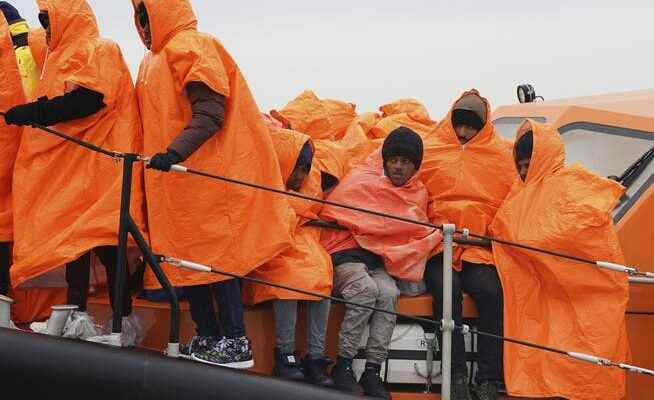Migration across the English Channel beats all records. After a stage victory in court, the British government hopes to keep the migrants from crossing to Rwanda with the threat of deportation.
A group of migrants are brought ashore by a British lifeboat after crossing the English Channel.
Rishi Sunak’s Tory government has won a major milestone in its fight against irregular migration across the English Channel. In a much-anticipated ruling, the High Court in London concluded that the controversial plan to deport asylum-seekers straight to Rwanda upon arrival in the UK was lawful in principle. The last word has not yet been spoken: the High Court wants to decide by January whether human rights organizations can appeal. Nevertheless, the government is hoping that it will finally be able to put its spectacular and controversial plan into practice.
No contradiction to international law
The pact with Rwanda sealed in spring envisages that some of the migrants arriving irregularly in Great Britain will be deported to the East African country 6600 kilometers away – with no prospect of ever returning to the United Kingdom. Rather, Rwanda should examine the asylum applications of the persons concerned and, if necessary, grant them protection. Excluded from the plan would be minors, as well as women and families.
So far, however, not a single asylum seeker has been brought to Rwanda. In June, the European Court of Human Rights in Strasbourg stopped the first planned deportation flight at the last minute, arguing that the British courts had not yet ruled on the fundamental legality of the Rwanda Pact.
But now the presiding judge at the High Court declared, Lord Justice Lewis, the Government has presented sufficient evidence that the deportees in Rwanda actually received a genuine and fair asylum procedure. Therefore, the plan does not contradict the Geneva Refugee Convention or any other overriding human right.
However, the judges stressed that the Interior Ministry did not adequately examine the specific circumstances of eight passengers on the canceled June deportation flight. The judgment should therefore mean that the threshold for deportations in specific individual cases will remain high.
royal criticism
Interior Minister Suella Braverman emphasized that the government now wants to implement the Rwanda Pact as quickly as possible. The plan will destroy the business model of the traffickers, who smuggle large sums of money from asylum seekers in order to send them on the dangerous journey across the English Channel in small boats.
It was initially unclear when the government was planning new flights to Kigali. What is certain is that the legal dispute could drag on if the High Court allowed further appeals in January. It is conceivable that the case will end up before the British Supreme Court or before the European Court of Human Rights. Human rights organizations are determined to use all available legal remedies.
The Rwanda Pact is the subject of both heated and morally charged controversy on the island. In the summer, the archbishops of Canterbury and York and 33 other high-ranking clerics criticized the plan as a “shame” and at odds with Britain’s Christian tradition. King Charles III is said to have called the Rwanda Pact “disgusting” shortly before his accession to the throne.
Sunak under pressure
It is also disputed how great the deterrent effect of the plan would be. The government announced in the spring that “in the coming years tens of thousands” of asylum seekers would be deported to Rwanda. But in the short term, capacities are likely to be limited to a few hundred. A new record number of more than 45,000 boat migrants crossed the English Channel this year. Therefore, a number of migrants should calculate the chances of being able to stay in Great Britain.
Prime Minister Sunak and Home Secretary Braverman are under great pressure to reduce migration numbers. In a European comparison, the number of asylum seekers in Great Britain is not particularly large. But the Brexiteers had promised the population in the 2016 Brexit referendum that they would regain control of the border.
After the end of the free movement of people in the EU, the government will be better able to control legal migration politically. But the number of irregular boat migrants has exploded, especially since the British no longer have a legal basis after Brexit to send asylum seekers back to EU countries. Sunak and Braverman hope to replicate the Rwanda Pact with other partner nations. According to Braverman, the aim is a new asylum system in which people seeking protection who arrive illegally in the country no longer have any chance of obtaining a legal right to reside in Great Britain.
